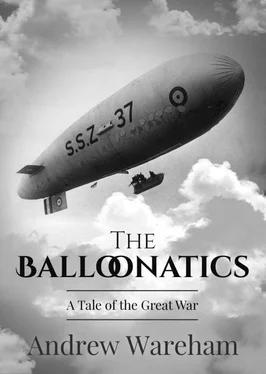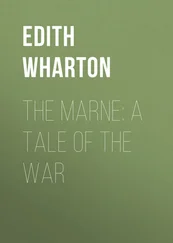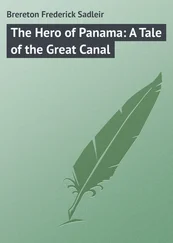A charabanc drew up in front of the hotel, a single deck motor bus used in peacetime to give holidaymakers a tour of the sights, and often their first ride in a motor vehicle. The hotel staff chased the late risers out of their beds and they pottered off to Polegate, most of them going to sleep in their seats, making up for a busy night.
Peter, who had enjoyed his evening with the rest, was content that morale had been lifted and that his officers were fit to go back to war again. It had been an expensive outing, he admitted; he had more money than he knew what to do with, so why not? The youngsters had needed a break from the long, tedious patrols. Now they had memories to keep them warm while they were out.
A Marine on a motorcycle rode through the gates in the afternoon, informing the guard he was carrying a despatch ‘what had to go to the CO in person’.
They admired his massive four hp Douglas bike, pointing the way to the offices and encouraging him to open the throttle. The noise would be good for the officers’ headaches, they were sure.
“Commander Naseby, sir?”
Peter nodded. There was no other commander within sight, he could be the only possible recipient of the despatch pouch.
“Sign, please, sir.”
The rider produced a blue pencil and a receipt book from a waterproof pocket up his sleeve.
“’Orders, one pouch, Commander Naseby, for the edification thereof’. Seriously, man?”
“I don’t write them, sir. Just gets them signed, sir.”
The Marine clasped tight to the pouch, making it clear that he would not let go short of a signature.
Peter chose to be edified, signed as indicated.
“Thank you, sir. Be getting back now, sir.”
“Where to, Marine?”
“London, sir. The Office, sir.”
He evidently assumed that Peter knew all about the Office.
“Payne!”
The PO appeared, eyebrow raised.
“Take this man to the cookhouse, get him something hot before he goes off again. Long way to London on a bike.”
“Yes, sir.”
Payne led the grateful marine away, chattering in friendly fashion. All that the man knew about the Office would be made clear in short time.
There was a lead seal to the pouch, needing to be cut away, at least preventing casual pickpockets from accessing its contents.
The orders were brief. He was to fly SS9 to a field outside Langemark, near Ypres, arriving there before noon next day. He shouted for Griffiths, knowing that one of the ratings in the cabin next door would run for him.
“Flying tomorrow morning, Griffiths. A course for Langemark, near the Salient. Exact location given here. A road and a railway line shown and a number of tramway tracks. Should be possible to spot the field. A flag will be flying to give a wind indication and there will be two companies of soldiers to act as a ground party. There are anchor points and ropes.”
Griffiths nodded. He could set a course for Ypres, he suspected. Close to the landing field and the tracks should give him a sufficient guide.
“Lewis and rifle loaded. No bomb. I’ll have a word with Pickles, see if he can fix up a carrying box in place of the bomb.”
Pickles did not think that was a good idea.
“Simpler to strip back the canvas behind your cockpit, sir. Make a small open hold. Hang four mail bags there to stick the load in. Anything fragile, sir?”
Pickles hummed thoughtfully on hearing of a pair of wireless sets.
“Bag of wood shavings underneath and on top, sir. Act as padding. Do all we need, well wrapped up. Carpenter’s shop will have a bin full of shavings and sawdust. Easy to get hold of. All be ready for the morning, sir.”
Peter made his way to the magazine.
“One cavalry carbine and rounds, if you would be so good, Handsworth. I feel the need to have something tucked away in my cockpit, a comforter, you might say.”
Handsworth simply stood and led the way to his small arms shed.
“One carbine, sir, if you wish. You might prefer an additional pistol. I have three Belgian made automatics, sir. Nine mil with half a dozen clips of eight rounds. Picked them up from a refugee coming through Harwich last year. Don’t know where he got them from but the crushers didn’t want him carrying them in England, passed them to me to dispose of safely. Tried them on the range, accurate up to fifteen yards, which is all you can ask of any handgun. Well made – as many of the Belgian guns are – their own design, owing a lot to the German models. Stick the issue Webley under the seat – in case you have to stand in front of senior officers and need to wear it – and put one of these on either hip. I have holsters.”
“Billy the Kid?”
“Just that, sir. Fastest draw in the West!”
Peter took the pistols, somewhat embarrassed; it seemed rather theatrical. He was nonetheless unhappy about playing cloak and dagger games in the night air above the Western Front and wanted something in the way of a weapon to hand, just in case.
Troughton telephoned before dinner.
“All ready to go, Naseby? Forecast for the morning is for near calm. Three days of light breezes, you will be glad to hear.”
“Delighted, rather, sir. All prepared, including a cargo place behind the cockpit.”
“Ah! Good thought that, Naseby. Didn’t occur to me… You’re right, of course, you will definitely need somewhere to put things.”
Peter hoped the men from the Office in London were less amateur. He recalled Captain Holder at Portsmouth saying that Intelligence had lost three officers and their boats on the Belgian coast since Christmas – that did not fill him full of confidence.
They took off early, soon after six.
Griffiths expected the run to take less than four hours at easy cruising speed.
“Can’t get too far lost, sir. They say the lines are like a great snake across the countryside with miles of devastation on either side. Impossible to miss.”
“So are we if they have aeroplanes up, Griffiths.”
“The Germans never cross our lines, sir. So the papers say – our boys have to go over to hunt them.”
“From what I have read about the Fokkers, I wouldn’t describe the process as hunting them, Griffiths.”
“It does sound peculiar, sir.”
They crossed the Channel, looking out for submarines as always, seeing nothing as was the case in all except a tiny percentage of patrols.
Peter wondered if unseen periscopes were tracking him, hiding away in fear of his bombs. He hoped so, though it seemed unlikely, the sort of thing the newspapers would say.
They crossed the French coast, not so far from Boulogne, they thought. There was definitely a busy harbour to the northeast and ships entering and leaving accompanied by the navy. It did not look like Calais to Peter’s vague recollection, so Boulogne was a likely identity.
“Course for Ypres now, sir.”
Peter turned slowly, pointed the blunt nose of the blimp more to the north.
Silence for some while, Griffiths scanning the land ahead with his binoculars.
“Got a railway line, sir. Come around five degrees north.”
Another prolonged silence.
“Got the trenches in sight, sir. Must be the Salient from the shape, sir. That battered town must be Ypres… I think. Lots of small gauge tram lines and a standard gauge railway track and a metalled road, sir. Come ten degrees to starboard and drop us to two thousand feet, sir.”
Nothing for two minutes.
“Got an open field, sir, with lots of soldiers on either side, dead ahead. Drop us in, sir… Belay that, sir! They’re playing football.”
Peter held course at a thousand feet.
“Hard aport, sir! I can see a flag and they are firing green flares, sir.”
Less than a quarter of a mile distant, too close to go straight in.
Читать дальше












